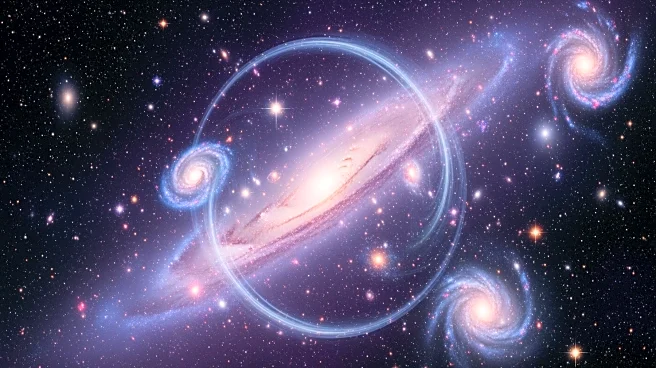What's Happening?
Recent studies have challenged the long-standing assumption that dark energy remains constant throughout cosmic history. Researchers, led by Associate Professor Tomoaki Ishiyama of Chiba University, have conducted extensive cosmological simulations to explore
the effects of a time-varying dark energy component. Using Japan's supercomputer Fugaku, the team executed high-resolution N-body simulations to compare the standard Lambda Cold Dark Matter (ΛCDM) model with dynamic dark energy models. The findings suggest that variations in dark energy, when combined with increased matter density, could significantly influence the formation of massive galaxy clusters and the large-scale structure of the Universe. The study, published in Physical Review D, highlights the potential for evolving dark energy models to better fit observational data from the Dark Energy Spectroscopic Instrument (DESI).
Why It's Important?
The implications of dynamic dark energy models are profound for cosmology, as they could reshape our understanding of the Universe's expansion and structure formation. If dark energy varies over time, it may lead to more accurate predictions of cosmic phenomena, such as galaxy clustering and baryonic acoustic oscillations. This research could influence future astronomical observations and the interpretation of data from upcoming large-scale galaxy surveys. By aligning theoretical models with real-world data, scientists can refine cosmological parameters and improve the accuracy of cosmic predictions. The study underscores the importance of considering dynamic elements in cosmological models, which could lead to breakthroughs in understanding the Universe's evolution.
What's Next?
The research sets the stage for future observational campaigns, such as those from the Subaru Prime Focus Spectrograph and DESI, which are expected to enhance measurements of cosmological parameters. These upcoming surveys will provide new data to test the dynamic dark energy models further. Researchers anticipate that these observations will refine the understanding of cosmic structure and the role of dark energy in shaping the Universe. The study provides a theoretical framework for interpreting future data, potentially leading to a paradigm shift in cosmology. As new technologies and methodologies emerge, scientists will continue to explore the complexities of dark energy and its impact on the cosmos.
Beyond the Headlines
The exploration of dynamic dark energy models raises ethical and philosophical questions about the nature of the Universe and our place within it. Understanding the forces that govern cosmic expansion could influence broader scientific and cultural perspectives on existence and the cosmos. The research also highlights the collaborative efforts of international teams, emphasizing the importance of global cooperation in advancing scientific knowledge. As cosmologists delve deeper into the mysteries of dark energy, they may uncover insights that challenge existing paradigms and inspire new ways of thinking about the Universe.
















